


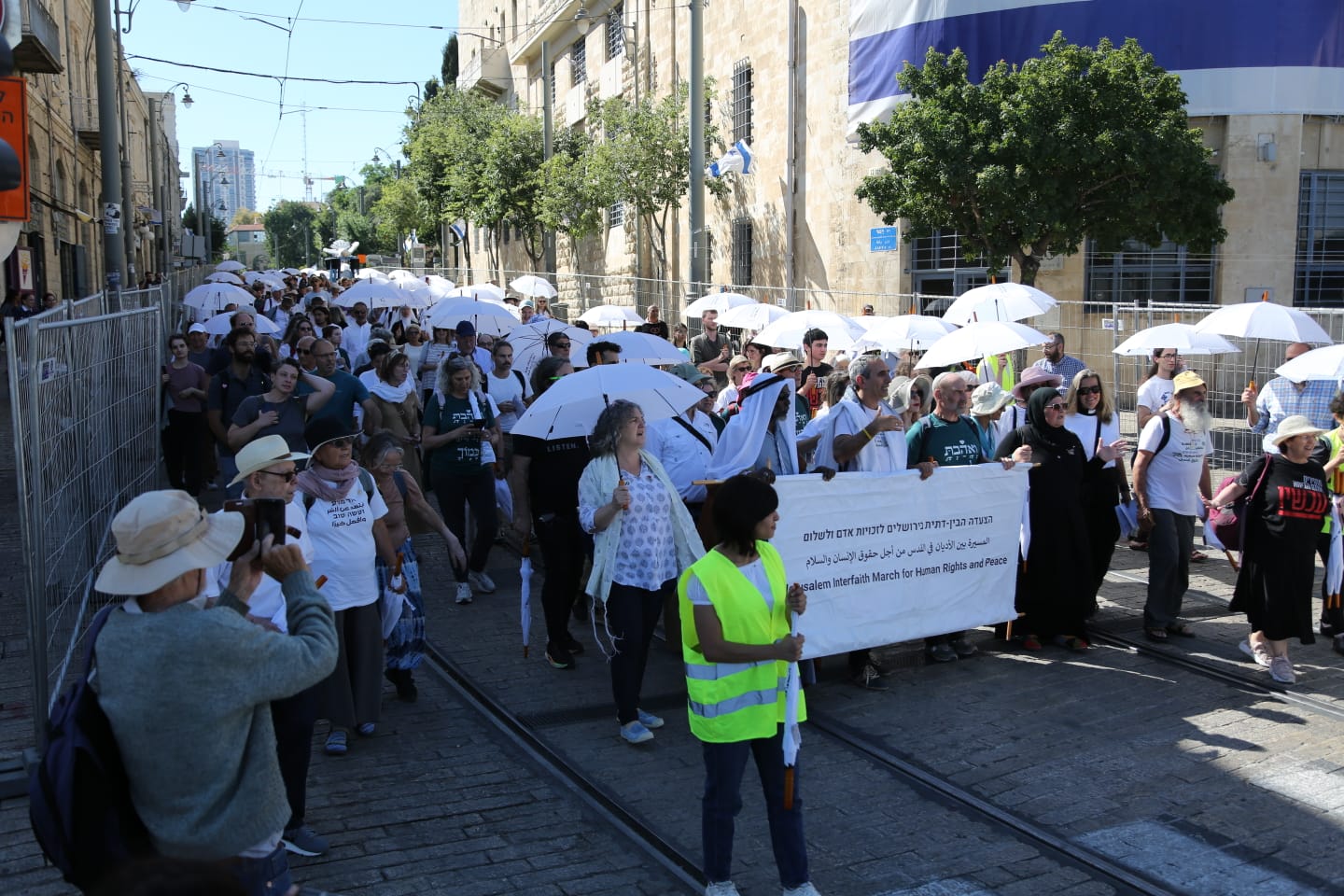
For Ori Weisberg, taking part in the Interfaith March in Jerusalem for Human Rights and Peace on Wednesday was crucial.
“Jerusalem is the most important place in the world, and 40 percent of it is not Jewish,” Weisberg told The Times of Israel as several hundred participants approached the Old City’s Walls after walking down Jaffa Street. “Jerusalem is supposed to be Jewish, Muslim, Christian and cosmopolitan. The effort to turn it into a city of Jewish chauvinism where both its inhabitants and its visitors are mistreated and humiliated is a desecration.”
Weisberg on Monday went to the Old City, where he practiced protective presence to defend the local Palestinians from harassment from Jewish youth who took part in the Jerusalem Day Flag Parade through the Muslim Quarter.
“I am here also to respond to that,” he said.
Organized for the third consecutive year in Jerusalem’s city center, the Interfaith March aimed to be a response to the Flag Parade and to mark the 600th day since the October 7, 2023, Hamas-led attack started the ongoing Gaza war.
“This terrible day began the bloodiest period in the history of the Israeli-Palestinian conflict, which has been going on for 20 months,” said Rabbi Avi Dabush, CEO of Rabbis for Human Rights, one of the organizers.
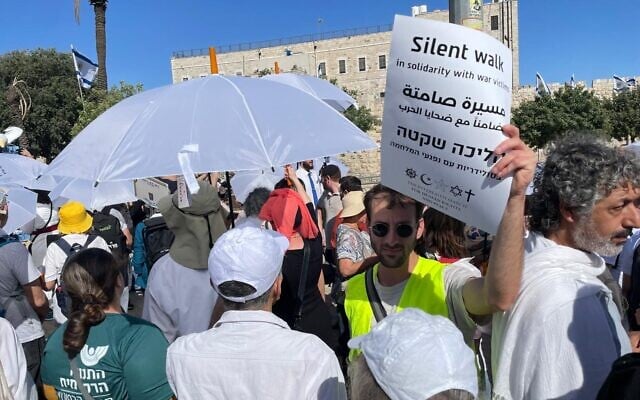
A resident of Kibbutz Nirim, Dabush on October 7 spent hours in his shelter with his wife and two children as terrorists attacked the kibbutz, killing five civilians and abducting another five.
“We still cannot go home; we have lost hundreds of friends, and there are still 58 Israeli hostages in the Hamas tunnels,” Dabush stressed as he opened the rally at Zion Square. “But, the equally great struggle is to maintain our values. To stand up against the massive death of children and women in Gaza, to raise a consistent and principled voice against the war and against those who think there aren’t innocent people.”
Dabush dedicated his remarks to Vivian Silver, a peace activist and founder of the organization Women Wage Peace, who was murdered in the Hamas onslaught.
“Today we had to be here,” said Kefaia Masarwi, a member of Women Wage Peace who took part in the March. “What is happening is horrible for everyone. We came to say enough with the war, enough with the time the hostages are not returning, enough with killing children.”
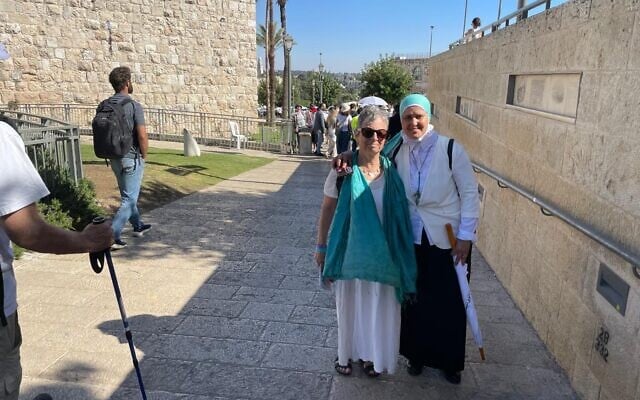
“There are many places where we could have been today, but I am here because Jerusalem is supposed to be the city of peace, and it’s so much the opposite now,” echoed Jo Even Caspi, another Women Wage Peace activist. “We must go back to the source, which is believing that we are one under one God.”
As the event began in Zion Square, some passersby expressed their discontent with the initiative’s message, with one man shouting in support of the war in Gaza as one of the hosts was welcoming participants in Arabic.
The organizers, which included about thirty interfaith, religious, and human rights groups, such as Standing Together, the Swedish Theological Institute and the Ahmadiyya Islamic Community, also distributed copies of the main speeches, songs, and prayers translated into Hebrew, Arabic and English.
Priests, nuns and pastors, kippahs and headscarves-wearers were recognizable among the participants, many of whom sported white shirts and white umbrellas, as they walked in the direction of the Old City, singing the iconic piece associated with the US civil rights movement, “We Shall Overcome.”
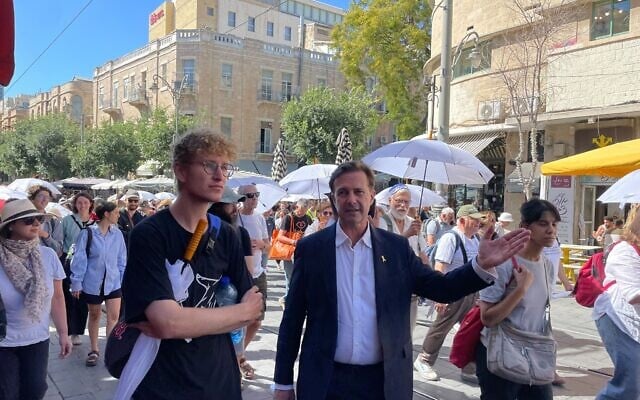
Among those who joined the march was also German Ambassador to Israel Steffen Seibert.
“Jews, Christians and Muslims walking together for the peace that this country and this region deserve gives me hope,” Seibert told The Times of Israel.
“Don’t let people tell you that there can be no peace and that Israelis and Palestinians are forever doomed to be hostile to each other,” he added.
On Tuesday, Chancellor Friedrich Merz had criticized Israel’s operations in Gaza.
“The massive military strikes by the Israelis in the Gaza Strip no longer reveal any logic to me. How they serve the goal of confronting terror… In this respect, I view this very, very critically,” Merz said at a leaders’ summit in Turku, Finland.
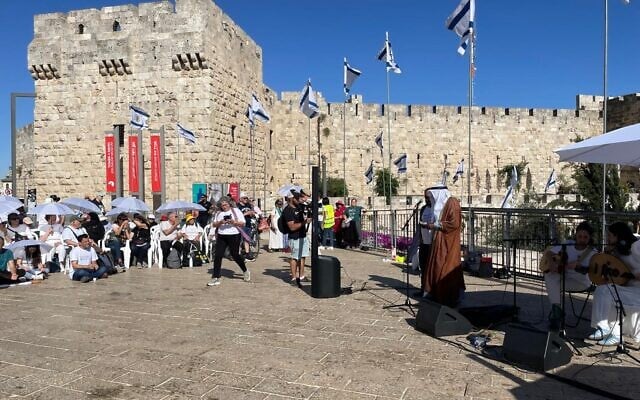
At the march, Seibert reaffirmed Berlin’s support for Israel.
“This is in our political DNA,” he said. “We know our responsibility for the state of Israel. It’s also a responsibility for the security and the peace of the state of Israel, and we take that very seriously.”
The participants rallied again in front of Jaffa Gate for more prayers and singing. Sheikh Hassan Abu Elyon, from the Bedouin Community in Rahat, was among the religious leaders who took the stage.
“In Islamic tradition, salam [peace] is one of the names of God,” he said. “As it is said in the texts when someone blesses you with peace, you must return the blessing. May God bless everyone, Jews and Arabs, Muslims and Christians.”
According to Father Piotr Zelazko, Patriarchal Vicar for the Hebrew-speaking Catholics in Israel, attending the march was important because “this is a crucial moment in the history of Israel.”
“Despite the darkness that surrounds us, there are many people who believe there can be peace, which is not only the absence of war but also social justice and relationships with the other,” he said. “When we human beings cannot make peace, we have to ask for God’s help. He is the one who can make it happen.”
Zelazko explained that there are seven Hebrew-speaking Catholic congregations in Israel, with some 1,500 members.
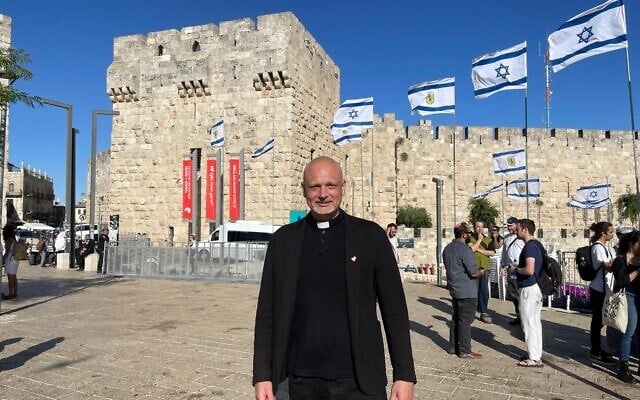
“After a year and a half of war, things are not easy,” he said. “Every day we pray for the hostages, for peace, but also for our children who serve in the [Israeli] army, that they can come back.”
Asked about how the Catholic Church is often perceived as closer to the Palestinians than to Israel, Zelazko reaffirmed the Israeli identity of his community.
“We have been part of this country for 70 years, and for 70 years, we have been 100% Israeli and 100% Catholic,” he added. “While it is true that more Catholics speak Arabic, we do exist, and we belong to both the Church and Israel.”
